There’s a curious contradiction in the sport of musky fishing. As I’ve come to understand the pattern here in my native central Virginia, you’re most likely to boat one of these southern coldwater gangsters in the spring and fall months when water temperatures are ideal. The spring’s reproductive mood sparks an especially aggressive attitude, inspiring more fish to chase flies. With the bite of winter, however, comes the rivers’ highest average flows and thus the opportunity for boating truly large musky is bolstered. As a result, this is the period—from December through February—that many musky maniacs label “prime time.”
In a game of already low percentages—one in 10,000, as it is often quipped—prime time musky fishing can be especially trying. Slow, even as slow goes. But the contradiction becomes normalized when you recall that those infected with the musky bug are gluttons for punishment by nature (What’s an extra 2,000 casts for a bigger fish?) Musky fishing is, then, by one very realistic definition, an exercise in superhuman optimism, one that is made most paramount during the doldrums of winter.
The very best of optimists and musky fishermen alike are known for their ability to visualize and pursue the “best case,” and so I was on a temperate late-December morning, my raft in-tow towards the Shenandoah River. Two friends met me at the ramp—David Gregory, whom I’d fished with before, and Cardo Lianez, whom I had not. Both are musky fishermen, though only David has boated a fish. But that’s beside the point. A newbie to musky fishing cannot be distinguished purely by their fish tally. Together, with myself in the rower’s seat, we pushed upstream from the ramp, to the head of a long flat, and began fishing as we drifted back downstream towards the takeout.
Cardo is a local with fingers in the fishing intel, and he spoke of a dozen musky being seen in the week previous to our trip. But the water level had been dropping steadily for more than a week, and the river we fished that day was low and exceptionally clear.
We casted for four hours—three of us—and never saw one of those 12 fish move in the lucid depths. As far as we could tell, the Shenandoah musky had ceased to exist; the river and all its life frozen for the season. But the musky were undoubtedly there and the possibility of catching one as real as always.
More Like This
Apart from the general sluggishness of winter, there are also the personal musky doldrums that exist independent of the seasons, and I’m fortunate to fish with a few champion optimists that know them all too well.
The day following that zero-score trip, David and I picked up Ben Rogers, a hardcore musky nut from Ohio, on our route south. We met Spotswood Payne of The Albemarle Angler at a put-in on the upper James River—arguably, along with the New River, the best musky river in the state—distributed ourselves among the boats, and began an all-day float—once again in low, clear water.
Dave rode in the bow of my boat as we shoved off, shot a stretch of rapids, and dropped into the first flat. He stood up, stripped line from his reel and began casting at the bank.
I’ve just recently been infected with the musky bug, and I’ve not landed a fish. It was four trips ago that I saw my first fish, following my fly out of a deep, green eddy on the New River. David, on the other hand, hooked and boated a 46-inch musky on his first trip. Since that day, he’s seen 13 trips and more than a year’s time without netting another. But he still chucks a fly in hopes of breaking the streak.
The first fish of the day was sighted in the second flat, after David took the oars and I stuck my fly on a rock on the bottom. As we approached the rock to free the fly, a fish glided past the boat, from the precise location of the fly.
Stories began to fly from Spotswood’s boat of a friend who had exceptionally poor luck landing his first musky. On one trip, he hung his fly on the bottom, and upon rowing over to the rock where it was stuck, saw a musky staring down the lodged fly which was only inches from its face. Another day, a fish broke character and took his fly in exceptionally fast water and began running upstream, taking to the air like a steelhead while the raft was pushed downriver. The fish was quickly lost. It took Spotswood’s friend almost 45 more days on the water to finally break the curse.
Ben knows what drought feels like, too. He gets on the water rarely these days and, at the outset of the trip, had seen five full days of fishing without so much as seeing a fish. Not a musky. Not a smallmouth. Not nothing. Nearly 50 hours of casting heavy flies in the cold with no reward. Shortly after dropping into the third flat of the day, Spotswood, in the boat with Ben, got a fish to follow. Ben’s arms struck a field goal position.
“Musky!”
All in attendance were definitively insane—David and I after our blank slate experience the day before, Ben for enduring five blank slates, and Spotswood for attempting to guide for such a mysterious being. But just being there isn’t enough. You have to place all your eggs in every cast, all day. You have to laugh and admit humility. You have to love the hunt for the sake of the hunt. And you have to know that, somewhere, there is a musky hungry and angry enough to eat your fly. You have to endure the doldrums to achieve reward. And you have to be willing to do it again.



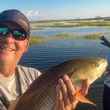


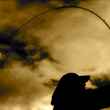


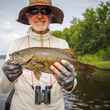
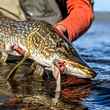

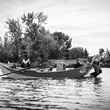

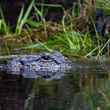


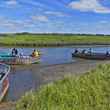


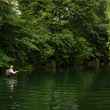




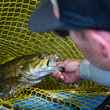

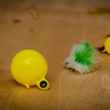

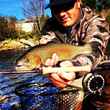

Comments